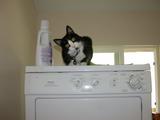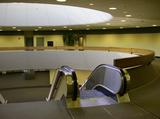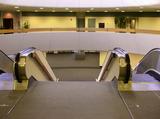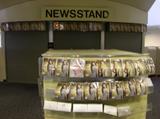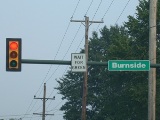September 02, 2003
The cat is levitating
Somehow, Jake managed to get on top of our dryer. Our dryer is stacked on top of the washer, which means that the top is ~6 ft. off the floor. But, somehow, he got up there anyway.Getting down on his own proved more difficult.
September 03, 2003
Homeschooling
A recent article on MSNBC.com discussed the growing trend of parents home schooling their children. The article focused on a family that started homeschooling after the oldest daughter kept having problems in school and was diagnosed as having ADD. Now the daughter is doing fine and is off Ritalin.
About once a year or so, I notice some major media outlet doing an article on homeschooling. The basic format is always the same: "Here are these kids that are home schooled and doing great. They have friends, they are excelling at school subjects -- life is great." And then, always, there is a quote from some supposed 'expert' on the dangers of homeschooling -- almost always something about how homeschoolers will suffer without "proper" socialization.
The MSNBC article includes this quote from Ted Feinberg, assistant executive director for the National Association of School Psychologists: "Unless you’re going to keep your children in a bubble for the rest of their lives, you have to expose them to a world that isn’t always sweet and nurturing."
The quote, fairly typical for such an article, implies that a home schooled child will grow up to be a vulnerable, scared, wisp of a person, unable to deal with the harsh realities of a cold world.
Like me?
At the age of 5, I entered kindergarten in Knoxville, TN. I have generally pleasant memories of the experience. I liked the kids, and I liked the teacher. School work was not a problem for me. Thanks to my parents, grandparents, aunts and uncles all reading to me practically from the day of my birth, I could read before the first day I started school. Math was fun for me.
Over Christmas break, we moved to Mansfield, Ohio. School there was very different. I quickly learned that school could be a mean, uncaring place. The rules were rigid, and you did NOT want to break them. I turned six.
After a summer break, I went back to the same school for first grade. The teacher was new, but she was cut from the same mold as the teacher I had just left. I remember her explaining to mom that she had already been warned about one of the kids entering her class, and she was ready to deal with him. The kid was one of my best friends. She hadn’t even met him yet, and he already had no chance. She was very unimpressed with me for being friends with him.
This, I suppose, is what Feinberg believes is a helpful situation for children, one that will serve them well later in life.
My parents despaired at the changes coming over their son. I came home grumpy, snapping at my little sister for any infraction. Math was a thing to be hated. And, thanks to the emphasis the school placed on learning to read by phonics, I could no longer read at all. My mother frequently told the story of my reading the word “lotion”, a word I could have read successfully at age 5, as “lah-tee-on”.
Finally, my mother saw John Holt on the Phil Donahue talk show. Holt was an advocate for something called “homeschooling”. Mom was so taken with the idea that my parents decided to pull me out of the public school system over Christmas break.
The next time I enrolled in any kind of formal education was when I started college, twelve years later.
It took a while to undo some of the effects of my year in Mansfield’s schools. I was nine before I showed even the slightest interest in touching math again. Then, by the age of 11, I was asking my uncle to explain the ‘Integrate’ function on my calculator to me. I took a while to bounce back, but when I did, I came back in a hurry.
While my parents originally tried to make my experience close to "school at home", we soon settled into a method described as "unschooling". We didn't have a curriculum or set subjects that I needed to study. I studied the things that interested me, following the paths to diverse fields of knowledge. My interest in the solar system led to the math and phsyics of planetary orbits, and the history of Galileo's and Newton's discoveries. Reading about Galileo led to the history of the Catholic Church's influence on the sciences, and the repression of Galileo's discoveries.
We did, eventually, move to a city that had a much better school system. The original plan had been to put me back in school once that happened. But by then, homeschooling had proven to be so successful for me that my parents decided to keep doing it.
To this day, most of the time when someone finds out I was homeschooled, they invariable ask, “but did you have any friends?” I had lots of friends – of all ages. I was writing shareware computer software by the age of 14. That led to an introduction to someone living in Boston who would, a few years later, get me an internship with Apple Computer before I even started college. Closer to home, I was involved in the local community theater, doing tech work for plays that brought me in contact with people from age 5 – 50. I did volunteer work for the local public library and met people there. I met other homeschoolers my age across the country.
When I was being homeschooled, it was still very unusual. At the time, the laws in most states didn’t prohibit homeschooling, but nor did most of them allow it. Mom, ever cautious, decided that the best approach was to simply not tell most people we were homeschooled. People assumed I was in school, and we didn’t bother correcting them. Later, by the time my three younger siblings were school age, laws were being passed allowing homeschooling. At the same time, it was becoming much more popular. My younger siblings had numerous friends of their age, in the local community, that were also being homeschooled.
Was I not being socialized?
Feinberg and others, unable to point to real, concrete examples of problems with homeschooling, continue to draw on fear, uncertainty and doubt to make their case that there just must be something wrong with it – something dangerous and, conveniently, hard to quantify.
Homeschooling is clearly not for every family, and public schools are not always bad. My wife loved her time in the public school system – so much so that she became a teacher. For her, it was a wonderful experience.
But, just as homeschooling is not for everyone, nor is the public school system. Homeschooling worked miracles for me; the public school system was crushing me. It was through homeschooling that I learned to deal with the world – both the good and the bad in it. In the end, I think, I turned out OK.
September 05, 2003
Not a good sign
You know it's bad when you try to set the coffee maker to brew a batch of coffee the next morning, and instead of turning it to the timer, you manage to just turn it on -- and then it's five minutes into the brewing cycle before you realize what you've done.
I need more sleep.
September 06, 2003
The site is live
Today, we pushed the new web site for the church live.
Tim did an amazing job on the design and layout for the new site. Almost the entire site is driven by MovableType. Custom MovableType plug-ins automatically create the navigation bars at the top of each section and automatically link names of people to a mailto URL with that person's email, and room names to a web page with a map of that section of the church.
Al, Tim and I are getting together next week to celebrate. It's been a LOT of work.
September 10, 2003
Oh, right, that's how we do it...
In an article about PowerPoint in the Mercury News last Sunday had this quote, on the history of PowerPoint:
"PowerPoint ... only reached market dominance when the software giant bundled the program with its Windows operating system."
Is this just a standard quote that lazy journalists include now anytime they are writing about Microsoft?
"[fill in the blank here] reached market dominance when the software giant bundled the program with its Windows operating system."
PowerPoint is NOT bundled with Windows.
September 11, 2003
Debugging email spam blocks
A lot of people in our church use AOL. Because of this, our pastor frequently emails a lot of people with aol.com email addresses.
Or he did, until his email started bouncing as spam. I would argue that sending a copy of the church bulletin to five people is hardly spam, but AOL's servers were insistent.
Al found the phone number for AOL's "postmaster hotline", where he talked to someone that insisted that the problem was that the IP address the church was using had been flagged as a source of spam, and we would need to talk to our ISP.
The problem with this explanation is that it made no sense at all. First of all, the church uses PacBell DSL with a dynamic IP address, so the IP address changes periodically anyway. And, I've never heard of blocking email because of the original source (which can be forged by any idiot anyway) -- you block mail relays instead. You block that because either the mail relay is deliberately sending spam, or because it was configured by an idiot that didn't realize that putting a mail relay on the internet that anyone can send mail through without a password is A Bad Thing.
But you don't block because of the supposed originating IP address. Al even tried, to no avail, to point out the absurdity of this to the AOL rep, asking if it was really their policy to just randomly block email originating from the heart of Silicon Valley because one address might have been used to send spam once.
So I called AOL yesterday. After 35 minutes on hold, I finally get to someone who tells me that no, of course it's not because of the DSL IP address, it must be because of the mail relay. I give him the IP address of the mail relay we use, which is provided by the church's hosting company -- the same one that hosts the web site (except when they do things like forget to start the Apache server, but that's another rant). He looks it up, comes back, and explains that it has no reverse DNS entry. Which I knew. But evidently, once a mail relay gets marked as 'bad' for whatever bizarre reason by AOL, it goes into their blocked list. And, once on that list, the first test that is done of the mail relay is to see if it has a reverse DNS. If not, it doesn't come off the list.
This still doesn't quite make sense to me. There must be some reason for it, I imagine. Perhaps a statistical study of spam has shown that servers without reverse DNS entries are more likely to be used to relay spam?
At any rate, the problem winds up being the one thing that I can't fix on my own. So now we have to wait for Westhost to add a reverse DNS entry. Unfortunately, Westhost is in the middle of screwing up migrating all of their accounts from one server setup to another, and in so doing, has basically managed to screw up every single one of them. When they migrated the church's web site, it took me about three hours to get it running again (starting Apache was the easy part, sadly). In other words, they aren't likely to get to this anytime soon. Meanwhile, my pastor can't reliably send email to a number of church members.
Every so often I read some apocalyptic treatise on how spam is going to result in the death of email. I usually dismiss these out of hands, but more and more, I catch myself wondering. Several months ago, I spent a while trying to convince the University of Michigan that my email relay wasn't sending spam. And, every so often, I notice that some piece of email that meriko sends through my mail relay gets blocked for no good reason. And now I'm fighting AOL over this. And herein lies the biggest problem with spam -- how do you block it, so your email isn't constantly filled with offers of bigger body parts, more money, etc., without causing such terrible headaches for people sending legitimate email?
We have a long way to go on this.
September 14, 2003
The value of web-based solutions
Yesterday, I realized just how completely different the system is for updating the church web site really is.
I wrote earlier about the new web site and how we're using Movable Type for a content management system. Yesterday, while trying to escape the terrible heat of the day, I had retreated to our bedroom, the one air-conditioned room in the house. I checked my email on my Pocket PC and found a note from Al about a problem he had run into while trying to update something. The problem was caused by a bad template I had left on the site. So, I logged into the web site and deleted it -- all from the Pocket PC, using its built-in version of Internet Explorer.
This is the power of a web-based solution for authoring -- instead of needing to go to my computer and use some web authoring software, I can update the site from something as simple as a PDA.
I was wondering when...
I was wondering when this would happen. Apple Records is suing Apple Computer for trademark violation -- again.
September 16, 2003
Trapped at work
People talk all the time about being 'trapped in the office'.
As I write this, I am. Literally.
Once before, my door got stuck and I couldn't open it. But that time, I was outside the office, so it didn't bother me so much. This time, I'm inside, so it is bothering me a little bit more.
The facilities helpdesk has assured me that someone will be coming right over.
Wildcard domains???
I mistyped a domain name today and ended up at a Verisign page. Thinking that was odd, I tried another random domain name. And another. It seems that every domain name in .com (at least) that isn't registered now resolves to Verisign, instead of returning an error.
$ host skjfwiejfwjf3i2j4fiwjf.com
skjfwiejfwjf3i2j4fiwjf.com has address 64.94.110.11
This is just wrong. What the hell is wrong with Verisign? Damn crackheads...
September 25, 2003
"Maybe it's time to start a state lottery"
CNN.com ran something this week where they invited readers to send in their responses to various questions asked of California's gubernatorial candidates in last night's debate.
Here's my favorite:
Question 2. How would you propose enhancing revenue and/or what specific cuts would you propose to achieve a balanced budget?Maybe it's time to start a state lottery. Virginia funds education with its lottery.
-- Patrick McConnell, Spotsylvania, Virginia
September 26, 2003
Spammers: can they be more irritating?
The latest delivery method for spam to me?
A comment left in one of my blog entries with links to purchase various products that I'm quite sure I don't need. At the end of the page-long list of URLs, it included the line "If you find this entry inappropriate please remove it from your database!".
<grrr>
September 29, 2003
The terminal that time forgot ... and the airline that time should forget
A week ago, we went to Philadelphia for Allison and John's wedding (pictures to come soon...). For our flight out, we chose to burn up our miles on US Airways. We accumulated too many miles flying on the airline when Meredith's parents lived in Pittsburgh, and this seemed like a good way to use them up.The terminal that US Air flies out of at SFO really demonstrates the decline in air travel over the last couple of years. The terminal was practically deserted. The (closed) newsstand had magazine covers from over a year ago. It was eery.
The trip was also an excellent reminder of why we haven't flown US Air since Meredith's parents moved away from Pittsburgh. It's safe to say that US Airways is my second least favorite airline (second only to Northwest). My favorite US Air story was from a few years ago, on one of our trips back home from Pittsburgh. The flight was supposed to be non-stop to San Francisco, but they explained to us, as we were boarding, that we would have to make an unscheduled stop in Kansas City. Well, they explained that after they begrudgingly found us some seats, as far apart as possible -- another favorite US Air trick with us. Later, on the plane, the flight attendant explained the reason for the stop: it turned out that they didn't have enough fuel to make it all the way to SFO. This was amazing for several reasons, not least of which was that we were, at the time, still on the ground in Pittsburgh -- where, presumably, they have jet fuel. And one wonders why the airline went bankrupt...
September 30, 2003
Wait For Green
More comments on the Philadelphia trip...Philadelphia traffic is very strange. The first odd thing was these signs, seen on many traffic lights, that say "Wait For Green". Isn't that pretty much the definition of a traffic light? I think if you need a sign to remind people that you are supposed to wait for green, you have a problem that the sign isn't going to fix. And, after spending a couple of days driving around the area, I'm convinced that they have a problem that the signs are not fixing.
Traffic is also weird because it lurches. On Sunday, driving from where we were staying in Plymouth Meeting into Philadelphia, traffic on the freeway would just suddenly come to a stop. Then, just as suddenly, it would go back up to 50-60 MPH for a few minutes before lurching to a stop again. We never saw any wrecks (except the one rear-end collision right in front of us that was caused by this lurching) or anything else that would explain it. Tess, who grew up in the area, said that traffic was always like that.
Weird.
Allison and John's wedding pictures
Pictures from Allison and John's wedding last weekend are posted here.
If only Frodo had had a net connection...
Maps can be helpful when you're trying to save middle earth.
